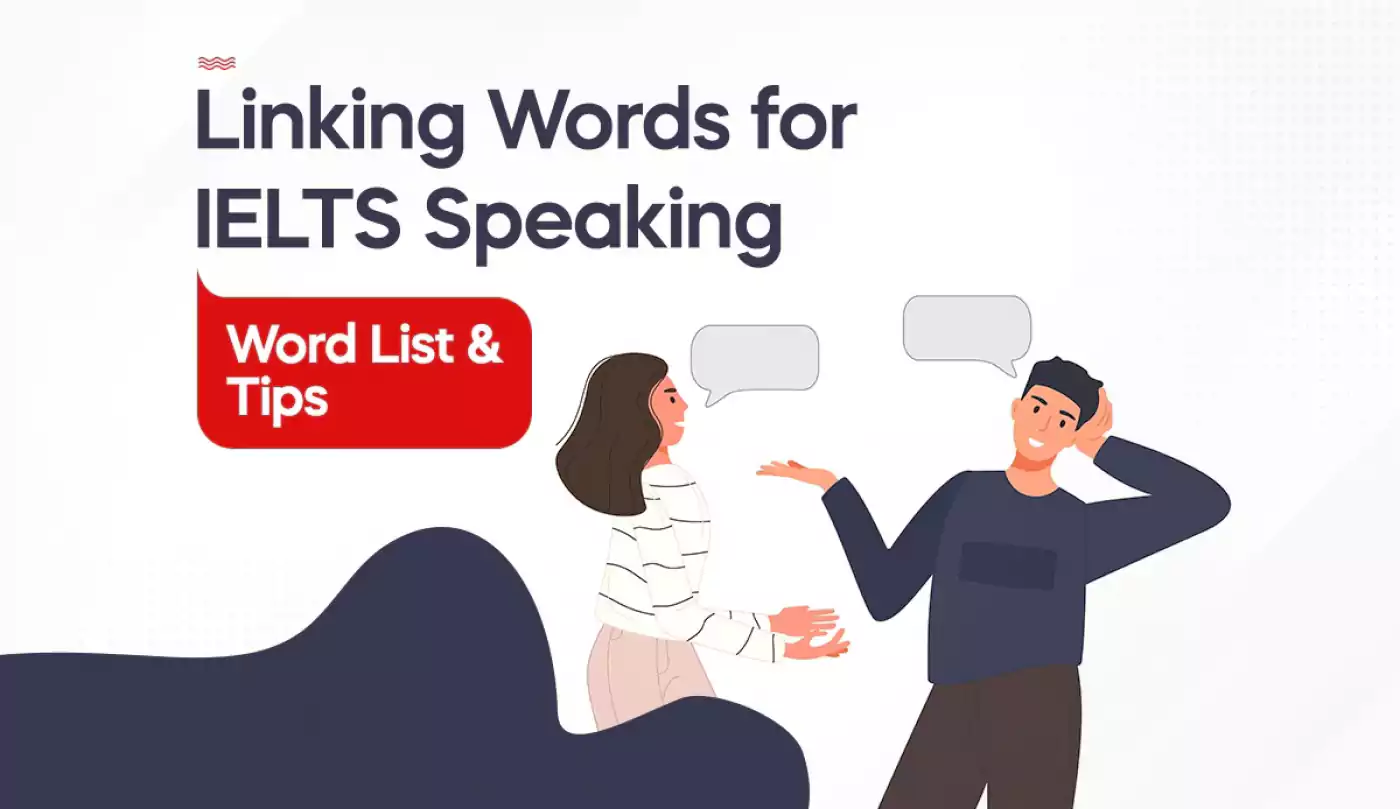• IELTS
Linking Words for IELTS Speaking - Word List & Tips
83509 Reads
3 min Read
- Discover what linking words in IELTS speaking means.
- Explore the word list of linking words used in IELTS speaking.
- Find some tips for using linking words in IELTS speaking.
- Discover the secret to linking words in your answers like a pro and impress the examiner with your language skills.

Linking words serve as the verbal "glue" that holds your ideas and phrases together. They aid in making connections between your sentences and are crucial in demonstrating your ability to organise your thoughts cogently in the IELTS test.
They are sometimes referred to as cohesive or connecting devices. Although many linking words can be used in both speaking and writing, some should only be used in writing, and others should only be used in speaking.
In fact, using "academic" or "written English" connectors in IELTS Speaking is one of the major mistakes students make. They occasionally use the following:
- Nevertheless
- Furthermore
- Thus
- It can be concluded that
Furthermore, this leads to the conclusion that this doesn't sound natural. When taking the IELTS Speaking test, you must employ spoken, idiomatic linking words.
Linking Words for IELTS Speaking – Word List
The blog here gives a list, tips and models of connectors or linking words for IELTS speaking. To help the examiner follow your ideas and concepts while giving the speaking exam, you will require some basic linking words and phrases that are spoken naturally. The linking words or connectors for IELTS speaking are very basic and informal.
Giving additional information
- As well as
- And
- Also
- Another reason is
Talking about time
- At the moment
- Right now
- At present
- These days
- Nowadays
- In the past
- Now
- Before
- Years ago
- When I was younger
Citing examples
- For instance
- Like
- Such as
- For example
Being clear
- As I was saying
- What I want to clarify is
- What I mean is
Concessions and Contracts
- Although
- But
- On the other hand
- Although
- While
- Or
Causes and Solutions
- Because
- The best way to solve this is
- I guess the only answer is to
- It was caused by
- I suppose the best way to tackle this problem is
- I guess it’s because
- The main reason is
Idea expression
- I think the main difference between A and B is
- I think one difference is
- I guess one important thing is
Some More Linking Words
| For example, for instance, to illustrate this | To give examples |
| Because, since, thus, that is why | To give an explanation or reason |
| Actually, I have to say | To preface what you really think |
| I must admit | To confess that something is true |
| On the other hand | To introduce another point of view |
| Well | To give yourself time to think |
| Also, as well as | To add ideas |
| Similarly, as, in the same way | To compare |
| Even though, despite, yet | To contrast |
| So that, so, for this reason | To express a result/purpose |
Even though this list is far from complete, it's a nice place to start.
Another recommendation for a band 9 response is to avoid using the same linking words more than once and to avoid using only the easiest ones (like and, or, but, however, still).
Make sure your linking words are varied and appropriate for the context; for example, the words "notwithstanding," "hereby," "hence," and "correspondingly" seem more natural when written down than when spoken.
Also read: IELTS Eligibility
Linking Words Examples for IELTS Speaking
In the following questions and answers, linking words that have been used have been highlighted.
Q: Do you like eating a lot of fruit?
A: Of course, I do. I love eating fruits like mangoes and pineapples which are tropical ones.
Q: Do you think junk food is bad?
A: Yes, I think so. If junk food is eaten quite often, it can cause health issues such as diabetes or heart disease. Also, eating junk food frequently can lead to obesity and weight-related problems.
Q: Do kids these days play similar games that were played in the past?
A: No, I guess they don’t do so. Earlier, kids used to play basic and simple games like hide and seek or they used to play with simple handmade toys. But, nowadays, kids prefer to play online or computer games and even their toys are machine or battery-operated.
Also read: IELTS Exam type
Common Errors in Linking Words for IELTS Speaking
The examples below, presented as questions and answers will help you understand what are the common errors in linking words in IELTS speaking.
Q: Do you like to go out with friends?
A: Of course, I like to do so. It gives me a chance to relax, and catch up with them. Finally, it allows me to visit new places
Errors: The linking words used here are too formal. This is inappropriate and might not help you get a high band score.
The answer should be spoken in the following way:
A: Of course, I like to do so. It’s fantastic to be able to get a chance to chill out and catch up with my friends. Also, we often visit new places which I enjoy a lot.
Also read: IELTS test dates
Tips for using Linking Words in IELTS speaking
- Avoid using formal linking words for answers to questions that are simple and ask you about yourself and your life.
- You need not worry about repeating linking words in IELTS speaking as this is not similar to IELTS writing.
- The most basic and common linking words for speaking are: but, and, because, like, also, etcetera.
- “Like” as a linking word is used to give examples in IELTS speaking only and not in IELTS writing.
- You might not get a higher band score if you used a various linking words.
- Linking words in speaking are used to aid the listener in understanding the spoken ideas and concepts better.
- Linking words are used informally in IELTS speaking.
- Linking words are a part of the marking criterion of “fluency and coherence”, which accounts for 25% of your marking criteria.
In conclusion, answering the exam question appropriately, offering sufficient detail, and displaying strong vocabulary and grammar are not the sole requirements for achieving band 9.
Additionally, make sure that your thoughts flow naturally and that their connections are obvious. Organizing and clarifying your response by using a variety of suitable linking words can also help you highlight the logic in your reasoning.
Also read : IELTS test centres
FAQ
Get great articles direct to your inbox
The latest news, articles, and resources, sent straight to your inbox every month.
Popular Universities to Study Abroad
World class education waiting for you.


Niagara College - Welland Campus
Ontario, Canada • 50 Programmes
Tuition Fee : CAD 16500-29000 / year


Massachusetts College of Pharmacy and Health Sciences (MCPHS) University - Manchester Campus
New Hampshire, USA • 4 Programmes
Tuition Fee : USD 56500-57000 / year

Portage College - Cold Lake Campus
Alberta, Canada • 8 Programmes
Tuition Fee : CAD 15500-17000 / year

University of Missouri-St. Louis
Missouri, USA • 139 Programmes
Tuition Fee : USD 25000-32000 / year

University of Mount Saint Vincent
New York, USA • 30 Programmes
Tuition Fee : USD 42500-43000 / year

TCS - The Chicago School of Professional Psychology - Washington Campus
District of Columbia, USA • 10 Programmes
Tuition Fee : USD 0-0 / year
Popular English Language Proficiency Exams
IELTS Online
- Live Classes
Blogs and Articles
Curated content to keep you updated on the latest education trends, news and more.
Updated on • Jul 17,2025 05:33 PM IST • USA
PTE Accepted Universities in Australia
Updated on • Jul 17,2025 05:09 PM IST • PTE
Part-Time Jobs for International Students in Australia
Updated on • Jul 17,2025 03:44 PM IST • Australia
Updated on • Jul 12,2025 04:02 PM IST • USA
Updated on • Jul 11,2025 11:32 AM IST • Education
CPT vs OPT: Meaning, Difference, and How to Apply
Updated on • Jul 11,2025 10:40 AM IST • USA
Masters in Computer Science in UK: Top Colleges, Eligibility, Scholarships
Updated on • Jul 10,2025 11:29 AM IST • study in the UK
Highest Paying Jobs in the World
Updated on • Jul 08,2025 01:40 PM IST • Study Abroad
MBA in Australia for Indian Students: Best Universities, Requirements, Scholarship, Courses, Jobs
Updated on • Jul 08,2025 01:35 PM IST • Australia
Canada vs Australia: Which Country is Better for Indian Students in 2025?
Updated on • Jul 07,2025 12:46 PM IST • Education
France vs Germany: Which Is Better for International Students?
Updated on • Jun 30,2025 05:15 PM IST • Education
Top 10 Agricultural Universities in USA
Updated on • Jun 27,2025 05:25 PM IST • USA
Most In-Demand Future Careers in 2025
Updated on • Jun 26,2025 04:41 PM IST • Education
How Much Do Nurses Make in the U.S.?
Updated on • Jun 23,2025 03:59 PM IST • USA
Updated on • Jun 21,2025 02:00 PM IST • USA
MBA in UK: Universities, Eligibility, Types, and Career Opportunities
Updated on • Jun 19,2025 04:09 PM IST • UK • study in the UK
Scholarships in France for Indian Students
Updated on • May 29,2025 05:22 PM IST • France
Intakes in Dubai for Indian Students
Updated on • May 27,2025 03:34 PM IST • Study in Dubai
France Student Visa 2025 – Requirements, Fees, Checklist & Application Process
Updated on • May 23,2025 03:36 PM IST • France
MBA in France for Indian Students in 2025
Updated on • May 22,2025 05:35 PM IST • France
Related Blogs and Articles
A little effort to provide an authentic and reliable content for keen readers!!
Updated on • 11-04-2025 • IELTS
Describe Your Hometown IELTS Speaking Part 1 Topic
Updated on • 07-04-2025 • IELTS
PTE vs IELTS : Know the Difference and Which is Easier?
Updated on • 21-03-2025 • IELTS
IELTS Exam Dates 2025 in India
Updated on • 18-01-2025 • IELTS
IELTS Reading Practice Tests 2025: Reading Passage and Sample Questions
Updated on • 15-01-2025 • IELTS
IELTS Letter Writing Topics 2025
Updated on • 15-01-2025 • IELTS
Canada IELTS band requirements 2025
Updated on • 10-01-2025 • IELTS
Updated on • 25-11-2024 • IELTS
Updated on • 21-11-2024 • IELTS
Updated on • 02-11-2024 • IELTS
IELTS Writing Task 2 - Academic and General Topics with Sample Answer
Updated on • 25-10-2024 • IELTS
IELTS Writing Task 2: Tips, Lessons & Models
Updated on • 25-10-2024 • IELTS
IELTS Test Report Form (TRF): Number, Tracking, Validity and Sample
Updated on • 25-10-2024 • IELTS
IELTS Speaking Samples and Answers
Updated on • 25-10-2024 • IELTS
Updated on • 25-10-2024 • IELTS
Updated on • 25-10-2024 • IELTS
IELTS Sample Charts for Writing Task 1 Practice
Updated on • 25-10-2024 • IELTS
IELTS GT Writing Task 1/ IELTS Letter Writing
Updated on • 25-10-2024 • IELTS
Updated on • 25-10-2024 • IELTS
How many times is the IELTS exam conducted in a year?
Updated on • 25-10-2024 • IELTS














